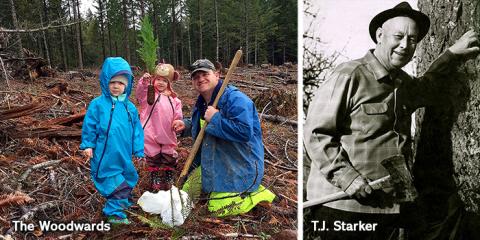Planting a seed…
March 17, 2015
First, happy St. Patrick’s Day. It’s a day about being green, and what’s more green than Oregon forests?
I recently spent a rainy morning planting trees with my husband and our 4-year-old daughters. Having two parents as foresters, our girls are used to enduring time in their rain gear “getting to” explore the woods. This outing wasn’t just about the number of trees we got in the ground (20 to be exact), but about the experience we shared. We weren’t the only ones out that morning; we joined about 170 volunteers for the 24th annual tree-planting day hosted by Starker Forests, Inc.
I have always had a great appreciation for the Starker family and their devotion to the land and community. I also have admiration for T.J. Starker, a fellow alumnus from the College of Forestry at Oregon State University; he was part of the first graduating class in 1910. Most all college students take temporary jobs the first year out of college; T.J. Starker took a temporary tree-planting job for $2.75 a day in the Oregon National Forest (now Mount Hood National Forest). This began his historic career in forestry and the pathway to a company that now has over 80,000 acres of Oregon forestland and employees about 20 people. The Starker family seems to have passed from generation to generation a love for the land, as well as a land ethic.
T.J. Starker’s second cousin, Aldo Leopold, is one of the names most associated with the concept of land ethics. (Leopold was the grandson of T.J. Starker’s great uncle Charles Starker.) In Wisconsin, Aldo bought a cabin, “the shack,” and took his kids out to plant thousands of pine trees. In A Sand County Almanac, Aldo set forth his most enduring idea: the “land ethic,” a moral responsibility of humans to the natural world.
Aldo Leopold’s land ethic idea is relevant in today’s society, but it can be difficult to define, discuss and implement. To even begin that monumental task, we need natural resource leaders who are committed to rolling up their sleeves and building a land ethic at the grass-roots level, in communities everywhere. I recently attended a workshop and spent some time with educators from the Aldo Leopold Foundation, who are working across America to try to spread this “Green Fire.” (Check out the video online for more information.)
In my eyes, it appears that the Leopold and Starker families have passed down a land ethic through generations. But how exactly is that taught? How do we help the next generation understand land ethic?
My answer was taking my daughters out tree planting. Starker Forests provided us an open space, the Douglas-fir and western redcedar seedlings, and even the shovels. And Starker Forests spent more on feeding us than the $2.75 it took T.J. a day to make. My kids each walked away with a “bragging T-shirt” that pronounced them tree planters, a belly full of hot dogs, muddy boots and a seedling for their own yard. For me, the most important thing was the connection we were making with each other and the forest. We didn’t call it land ethic training – we just called it fun.
Julie Woodward
Forest Education Program Manager
